Gathering at the historic Franklinton Center at Bricks in the eastern part of the North Carolina, UE’s statewide Local 150 held its 12th biennial convention on August 20 and 21. Nearly 70 delegates and guests gave reports on important victories and struggles across the state, discussed the role of community-faith-labor coalitions in winning broad social changes, and debated and adopted policy resolutions. Angaza Laughinghouse, a founding member and former president of the local, reviewed the history of organizing by rank-and-file workers in North Carolina which led to the formation of Local 150 in 1997, and the local’s history of struggle since then. Delegates also heard from guest speakers Bishop William J. Barber II, a long-time ally of UE in North Carolina and nationally, UE Eastern Region President George Waksmunski, and UE Director of Organization Mark Meinster.
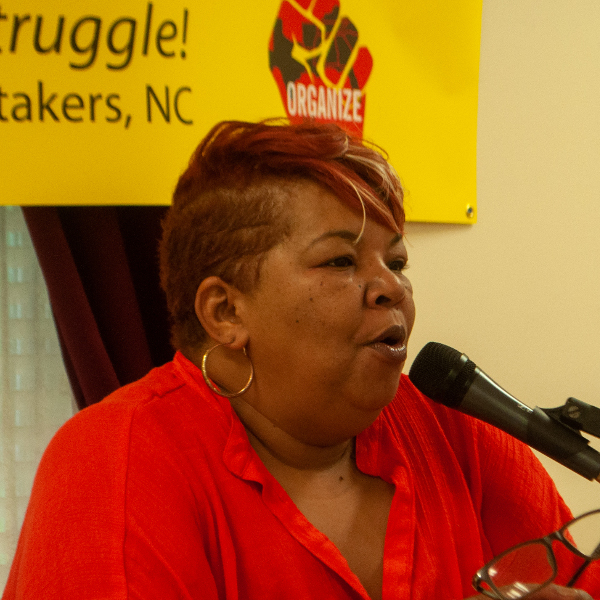
Local 150 President Sekia Royall
Local 150 President Sekia Royall welcomed the delegates on Saturday morning and reviewed the local’s work over the past two years in her State of the Union address. “Workers here in North Carolina and across the South are still in a major crisis,” she declared. “We have carried these cities and states throughout the years, and have always been essential workers, but the global pandemic has highlighted the critical roles we play in society.” Despite that recognition, “we still don’t get the respect that we deserve, with dignified wages and safety on our jobs.”
Because North Carolina’s General Statute 95-98 prohibits public-sector workers from negotiating collective bargaining agreements with their employers, Local 150 members have to win wage increases and improvements to their working conditions through direct action in the workplace, public protests and political action.
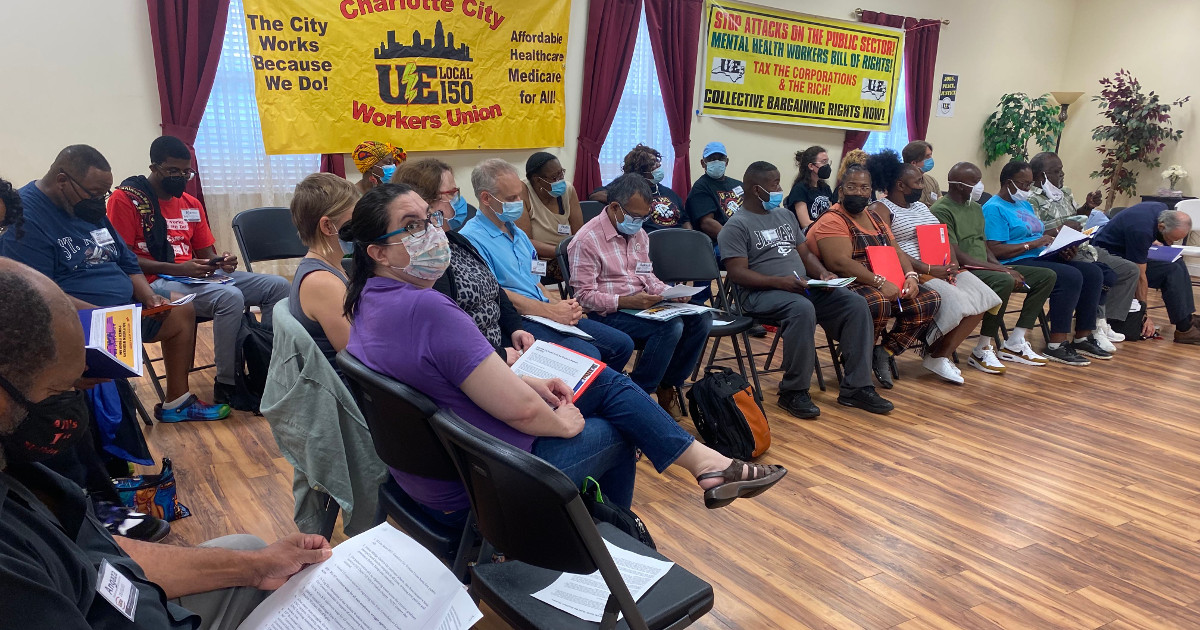
Convention delegates and guests
“Over the last 25 years,” Royall said, “UE Local 150 has pushed back against our bosses and the government with public speak-outs, press conferences,” and by demanding that bosses meet with the union in a process known as “meet and confer.” She reported that the union had recently won new meet-and-confer rights in three major cities of Charlotte, Greensboro and Durham. She also spoke about the union’s efforts to address understaffing in Department of Health and Human Services (DHHS) facilities and to abolish unfair fees and fight for safe jobs in the University of North Carolina (UNC) system
“As workers, we have a duty to ourselves and our families to stand up against these city managers and state officials and these major corporations,” Royall said. “We must know our rights and not be afraid to stand up and fight for what’s fair.”
Organizing the South
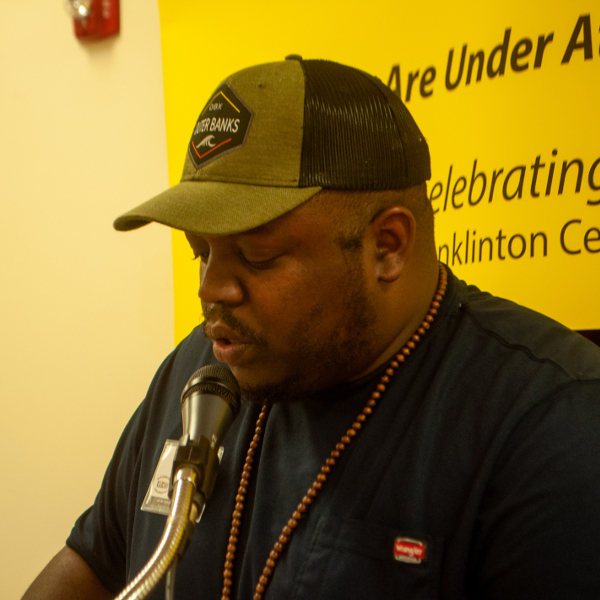
Local 150 Vice President Bryce Carter
Local 150 Vice President Bryce Carter moderated an “Organize the South” panel discussion, featuring representatives from the local’s various divisions: municipal workers, DHHS workers, UNC workers, and private-sector manufacturing workers. The panel also included a recorded video message from Terry Green, a city worker in Virginia Beach, Virginia who is a leader in the UE organizing campaign there.
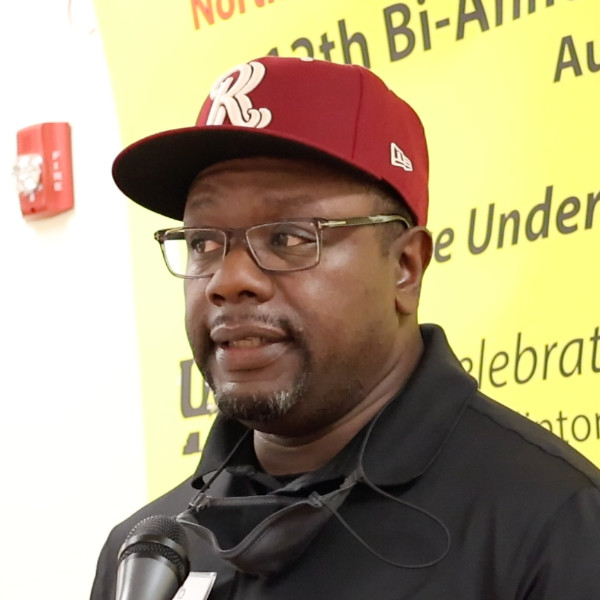
Rob Davis
Rob Davis reported on the Charlotte City Workers Union chapter’s successful and militant campaign for pay raises and improvements in this year’s city budget. “We were unified, we were together, we were strong, we shut down the street on several occasions. And the result of that was all the wins that we had.” Those wins included a $20 per hour minimum wage, a 10 percent wage increase, a 2.5 percent shift differential and a 2.5 percent differential for workers with CDL licenses. “All of the things that we needed, we got,” said Davis. “It was just a powerful thing to be part of and to see.”
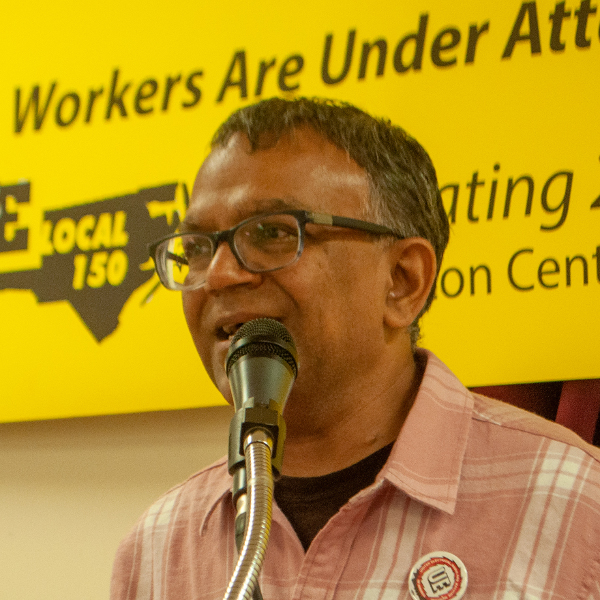
Rakesh Patel
Rakesh Patel, president of the Butner DHHS chapter, described that chapter’s “really successful run” of organizing, signing up almost 50 new members on one day in July of 2021. “What we did before we asked them to join is, we showed them what we were going to do,” said Patel. The chapter has been fighting for safe staffing at Central Regional Hospital through meet-and-confer meetings with the administration, rallies that garnered television and newspaper coverage, and spending a lot of time talking to staff.
He also said that the chapter has been active at Local 150’s annual political action days in Raleigh, making sure legislators understand “the crisis that is happening in our hospitals.” Despite this, Patel said, the state legislature has so far failed to provide adequate funding to address the staffing crisis. “Probably the most important thing we need to end up doing is to get a different set of folks elected,” he concluded, and to “try to make a difference in this November’s elections.”
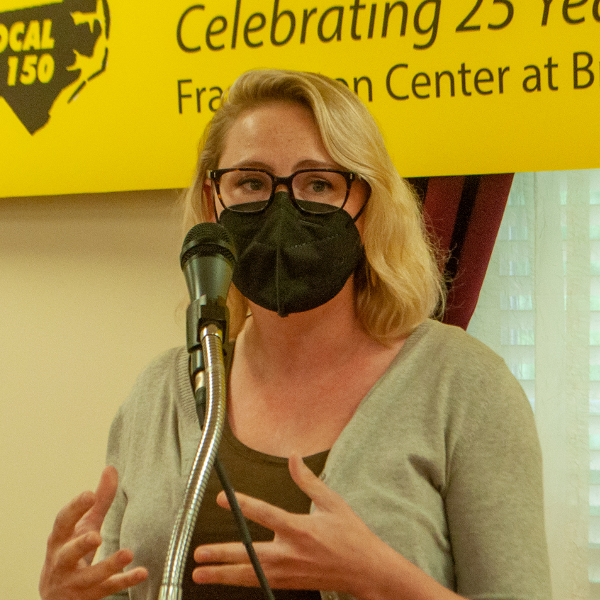
Miranda Elston
Graduate workers at UNC’s Chapel Hill campus were successful in getting fees abolished several years ago, reported Miranda Elston of the Workers Union @ UNC chapter, but graduate workers at other campuses, including North Carolina State and UNC Charlotte, are still paying those fees. The UNC division of Local 150 is “trying to bring the different campuses together” because “we are all under the same system and we have the same boss or president that dictates, but each campus has a different set of rules and regulations for the workers.”
Elston also reported on system-wide efforts by UNC workers to demand safe working conditions during the pandemic. “Through a huge effort” and coalition-building that extended throughout the UNC system, they organized a town hall meeting and a series of protests, and, as a result, “slowly PPE masks started appearing, they changed the clock-in system, and more protections started occurring.” The UNC division is now working to win across-the-board wage increases and end UNC’s “pay to work” policies which require graduate workers at most campuses to pay student fees and staff to pay parking fees, just in order to be able to come to work.
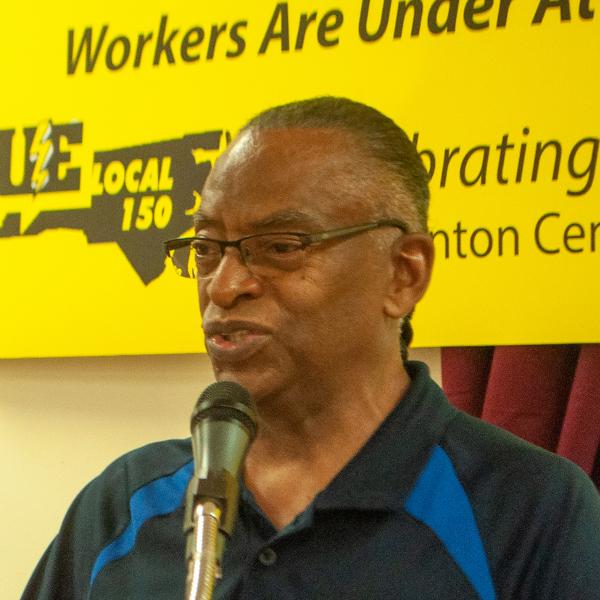
Marvin Arrington
Marvin Arrington of the Carolina Auto, Aerospace and Machine Workers Union (CAAMWU), Local 150’s private-sector division, spoke about efforts to get younger workers at the Cummins Rocky Mount Engine Plant involved in the union. “We have been able to accomplish a lot of things at the Rocky Mount Engine Plant,” he said, because the chapter’s newsletter, UNITY NEWS, “informs our employees of what’s on the table and what the company is not doing.”
Terry Green reported on how Virginia Beach city workers recently won a $15 minimum wage, a step plan, and significant wage increases. Following that victory, city workers are setting up a pre-majority union and signing up their co-workers. They are also interviewing city council candidates to determine their position on collective bargaining, said Green, “so we know who to vote for, coming up in November.”
He described how city workers organized and went to city council meetings, and to city council members, with “an agenda about money, about the conditions, basically about the city and the way they run everything.” He described the way city departments are run as “a bully system,” and said “it’s time for it to stop. And that’s why we need collective bargaining.”
“We’re not trying to get rich, we’re just trying to live in the city that we work in,” Green concluded.
Community-Faith-Labor Coalitions to Win Broad Social Changes
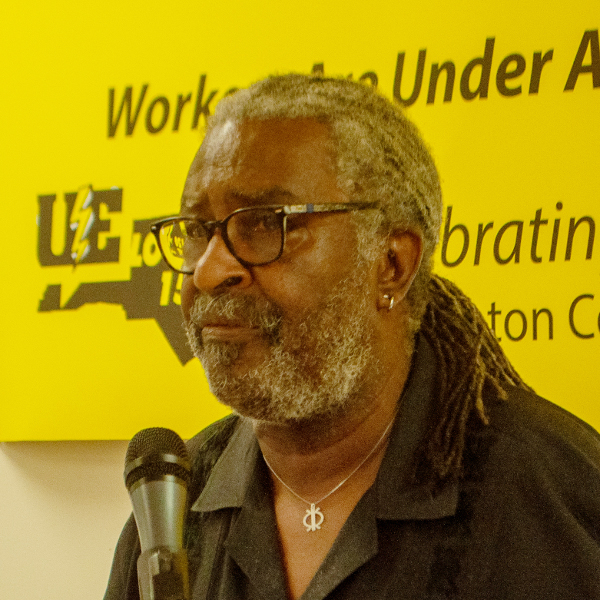
Ajamu Dillahunt
A second panel, on community-faith-labor coalitions, was facilitated by retired American Postal Workers Union leader Ajamu Dillahunt, a member of Black Workers for Justice and the Southern Workers Assembly. In his introduction, Dillahunt declared that Local 150 is “the feistiest, fiercest and most focused union here in the South” and that the local’s tradition of rank-and-file leadership is “the formula that we need for the battles ahead.”
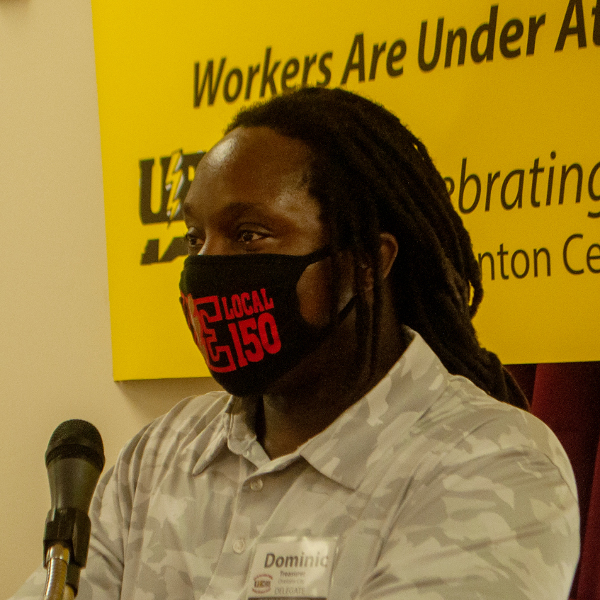
Dominic Harris
Local 150 Secretary-Treasurer Dominic Harris, who is also an active leader of the North Carolina Medicare for All Coalition, spoke about the campaign launched by the Southern Workers Assembly to win Medicare for All. “Our health care shouldn’t be in the hands of our employer, let alone a health insurance company that works like a mafia,” he said.
In addition to covering everyone’s health care needs, Harris said, Medicare for All would help address the staffing crisis in the health care system. “In our system now, DHHS workers don’t have the appropriate amount of personnel to even be able to treat people that are coming to the hospitals.” A Medicare for All system would “provide funding to be able to hire the proper amount of doctors. … You won’t have people sitting on the sidelines waiting to receive mental health care because the funding isn’t there.”
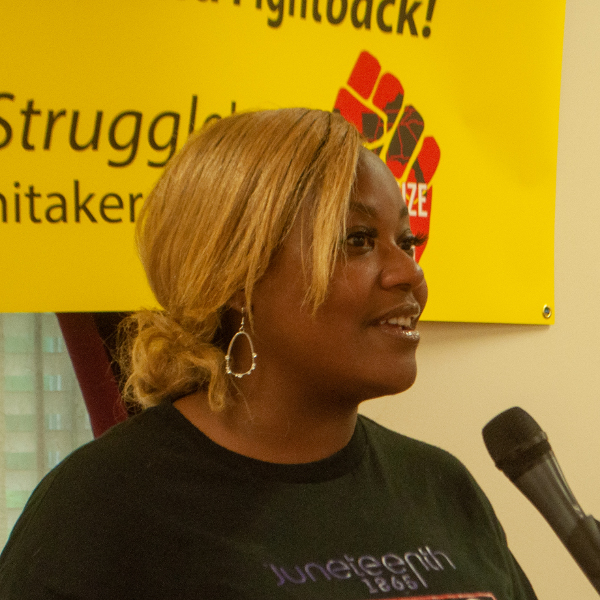
Nichel Dunlap-Thompson
Nichel Dunlap-Thompson of the Charlotte City Workers Union chapter blasted the June Supreme Court decision overturning Roe v. Wade. With that decision, she charged, “The United States government took a part of our bodies that belongs to us.”
“As a woman, deciding what is best for our bodies, for our families and our household, is a stressful ordeal by itself,” she said, but is made even worse when the government adds “restraints and barriers that stem from a group of mostly white men who hold no knowledge nor capabilities to create a life.” She pointed out that restrictions on reproductive health care will lead to higher mortality rates for those seeking abortions and greater emotional trauma for victims of sexual assault.
Dunlap-Thompson challenged the union “to continue to fight alongside us” to maintain women’s rights to make decisions about their own bodies. “Roe v. Wade has been overturned,” she concluded, “and now it’s our turn to shift our votes, raise the volume on our voices, and create the type of good trouble that I live for.”
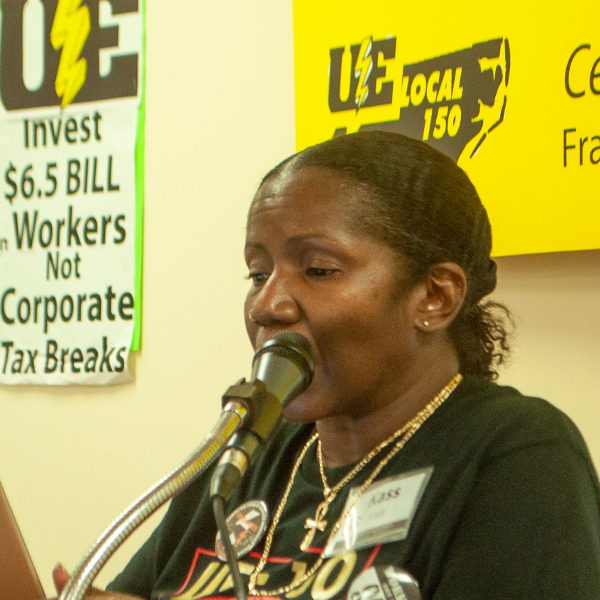
Kass Ottley
UE Field Organizer Kass Ottley spoke about housing crisis facing working people in North Carolina, where “severely cost-burdened” households, who are forced to spend more than half of their income on housing, are “more likely than other renters to sacrifice other necessities like health, food, healthcare to pay for their rent,” and are more likely to live in unstable housing situations due to eviction. “The construction of affordable housing has been chronically underfunded and regulated by racist housing policies,” Ottley said; she also noted that increasing economic inequality contributes to the housing crisis: “All of the resources have gone to the top, and none are staying at the bottom.”
Ottley outlined a number of policies that could improve housing conditions for working people, but said that “The most important thing is to pay people a living wage,” underscoring the importance of Local 150’s efforts to win decent wages for public-sector workers. Notably, Charlotte City chapter of UE Local 150 won a $2 million fund for city worker home ownership in this year’s budget.
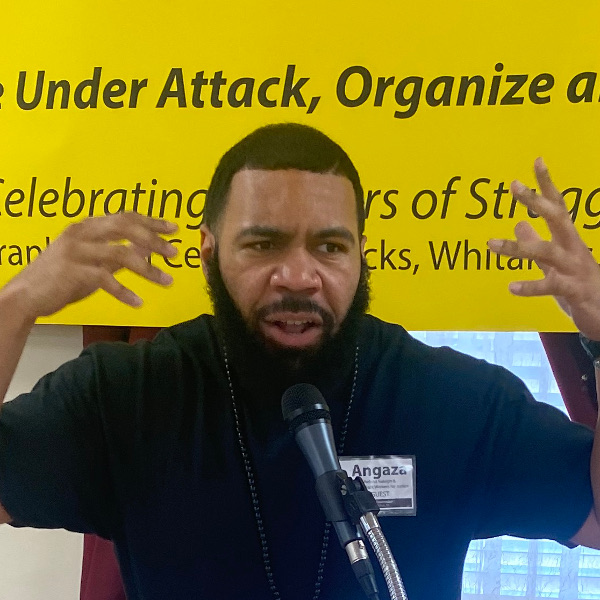
Angaza Samora Laughinghouse
Angaza Samora Laughinghouse of the Refund Raleigh Freedom Committee (the son of Local 150 member Angaza Sababu Laughinghouse), in his remarks about police accountability, contrasted the millions of dollars thrown at police departments with the constant underfunding faced by other parts of the public sector. “Police can do a bad job and get millions,” he said, while “we do a good job and get pennies.” At Refund Raleigh, he said, “We’re talking about reallocating money from these big, huge, swollen police budgets and putting it back into the things and people that make us safe — that’s y’all.”
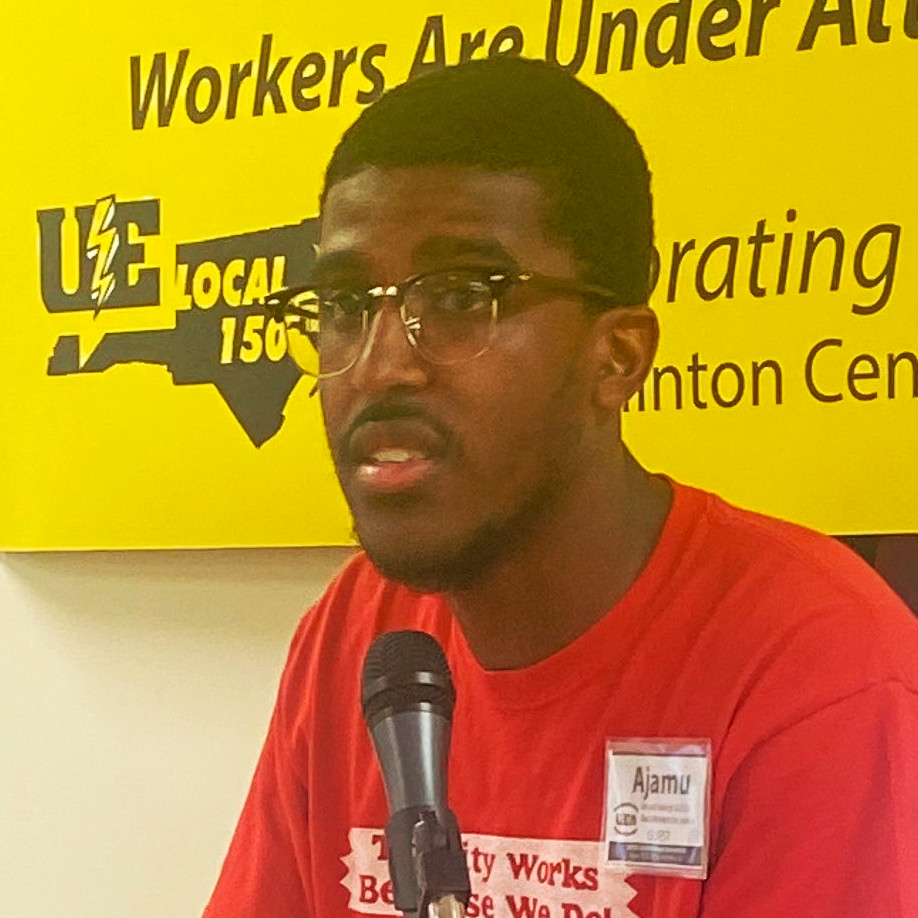
Ajamu Amiri Dillahunt
Ajamu Amiri Dillahunt, a Local 150 member at Eastern Carolina University and a member of the Refund Raleigh Freedom Committee, also let delegates know about the “Communiversity,” a project of Black Workers for Justice to provide education on the elements of Southern Worker Power Program and a space for workers to talk about how the issues in the program impact them.
“The chief cornerstone of a brand new democracy”
In a video introduction of keynote speaker Bishop William J. Barber II, retired Local 150 President Larsene Taylor noted that she introduced Barber, who is her pastor, to the local over 21 years ago, “and he’s still in the struggle with us.”
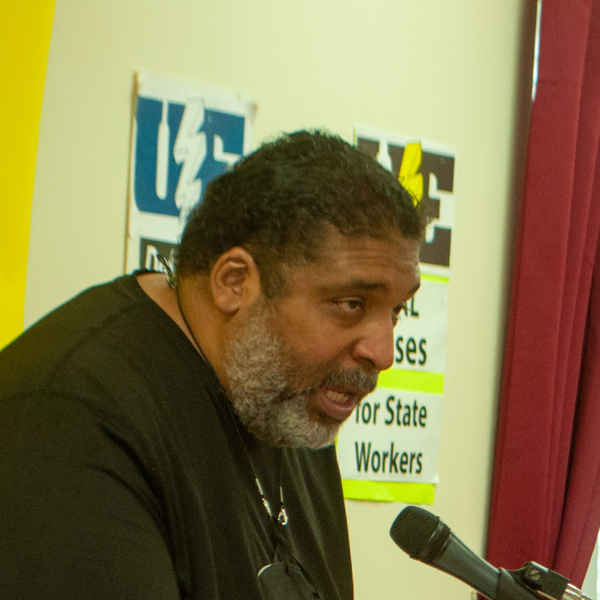
Bishop William J. Barber II
Bishop Barber began his remarks by reading the Langston Hughes poem “Let America Be America Again,” noting that Hughes wrote it during a workers’ strike in Harlem and that some say that it was the inspiration for Martin Luther King Jr.’s “I Have a Dream” speech.
Turning his attention to the present day, Bishop Barber described how the current divisions in the country are a result of Republican politicians’ intensification of the “southern strategy,” an effort by the Nixon administration to intentionally polarize the country along racial lines in order to ensure Republican dominance.
He then spoke about the assault on voting rights since the 2013 Supreme Court decision invalidated large portions of the Voting Rights Act. He particularly noted the role of the Chamber of Commerce in blocking legislation to restore voting rights. After Democrats won a slim Senate majority in the 2020 election, the employers’ organization called on corporate-Democrat Senators Joe Manchin and Kyrsten Sinema to block two pieces of legislation: raising the minimum wage and restoring voting rights. As Bishop Barber pointed out, “You can never separate the battle for voting rights and the battle for economic justice.”
Those battles are a matter of life and death, Bishop Barber said, because “poverty and low wages are created by policy,” and 700 people per day die from poverty. He described these deaths as “policy murder,” and suggested that working people should be protesting these deaths as vigorously as deaths caused by police murder.
The fact that federal legislation adopted during the pandemic reduced poverty significantly (but temporarily) proves, he said, “that poverty does not have to exist. There is no scarcity of resources, the scarcity is in consciousness.”
Bishop Barber then went on to detail the shockingly large number of Americans who are poor or low-wage workers, and the degree to which people of color disproportionately suffer from poverty and low wages. However, he said, the fact that so many people have been pushed into poverty and low wages make poor and low-wage people into a powerful voting bloc — if they are organized.
“The Bible teaches us that there comes a point when the stones that the builders reject become, or have the possibility of becoming, the chief stone of a whole new social construction,” he said. “They have rejected a whole lot of folk but now the rejected control nearly 50 percent of the voting power in this country.”
He described his experiences talking to poor and low-wage people in rural areas of Kentucky, areas that are often described as “Trump country,” and being told that people simply don’t vote, because they don’t believe that any politicians care about them. Bishop Barber said he challenged them: “If they don’t care about you, why don’t you make them hear you?”
Several of those “red” counties flipped in the Kentucky governor’s election of 2019, helping to remove a Republican governor who opposed living wages and healthcare, but as Bishop Barber pointed out, “They didn’t go blue — they went organized!”
“If we just get together,” he said, “if poor and low-wealth Black folk and white folk and Natives and Asians get together and begin to mobilize around an agenda and vote as a bloc, we can determine … who sits in every office of this state.”
Bishop Barber challenged UE members to rise to the challenge of seizing the power that the working class has: “There comes a point when God has made you the cornerstone, [and] you’d better recognize it. … The stones that the builder rejected have now got the possibility of being the chief cornerstone of a brand new democracy, and it’s high time we act like who we are, the cornerstone.”
“Now is our time to fight”
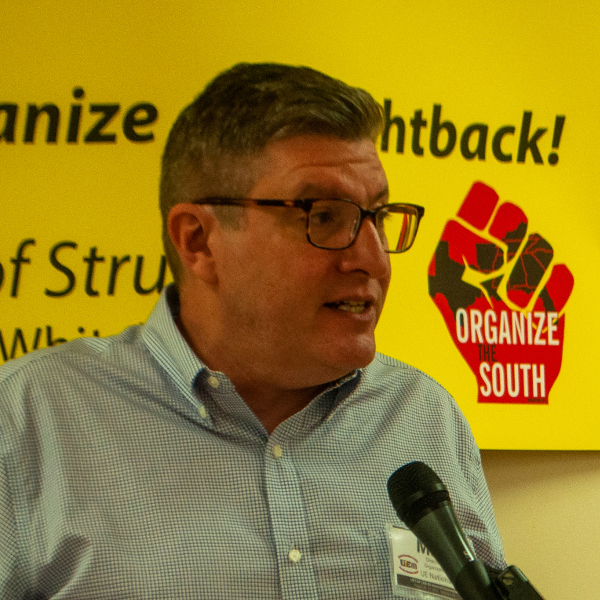
Mark Meinster
UE Director of Organization Mark Meinster began his remarks to the convention by declaring that “For our union, UE150 has been incredibly important, not only because of the membership base that you all have built down here, but much more importantly because of the fighting spirit that you have brought to the rest of our membership [and] the political clarity that you’ve brought to our conventions and to our regional council meetings. That’s been incredibly important and inspiring to our entire membership, and really, I would say, to the whole working class.
“And that fighting spirit — we’re going to need that in this coming period.
“We’re seeing something amazing happening out there among workers. We’re seeing people start to organize more, strike more, rise up in their workplaces.” He pointed out that this upsurge is being driven by young people, many of whose “first experience of collective power” was the racial justice uprisings in 2020 following the police murder of George Floyd, and that it is not being driven by mainstream unions — “This is being driven by workers themselves.”
He noted that in the current economy, three people are quitting for every one who is fired. “That gives us a lot of power right now, that gives us a lot of leverage.”
But, Meinster warned, “corporations and the rich are not going to just sit by and let that happen.”
He described the corporate push to address inflation by “cooling off” the economy in “plain English” as “They want to make us too poor to afford the things that we need to survive. That’s what ‘cooling off the economy’ means.”
“The bottom line is this,” Meinster concluded, “now is our time to fight. It’s a union like ours that people need in this moment: a militant union, a rank-and-file union. So let’s go out, let’s organize, and let’s bring the fight to these bosses.”
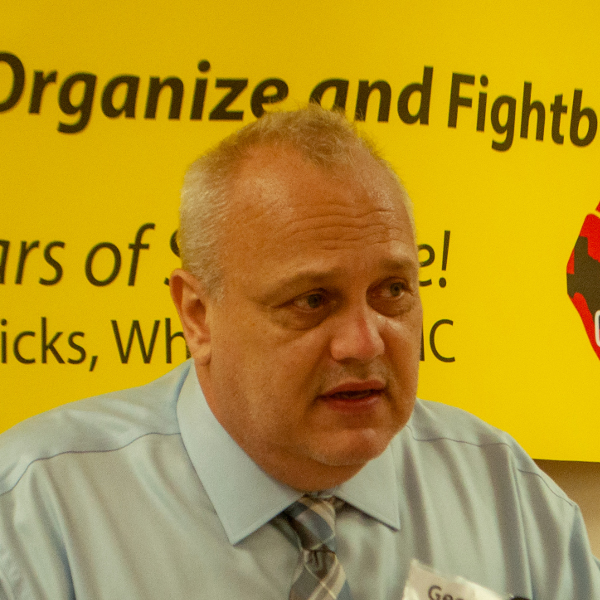
George Waksmunski
Eastern Region President George Waksmunski, in his remarks, told Local 150 members that “It’s always been amazing to watch how this local fights. You fight like no other, your struggle is like no other, and you’re inspirational to everyone who witnesses the work and effort and struggle that you engage in.”
He emphasized that “we’ve got to go out there and find the leaders of today and tomorrow” in order to “build this labor movement into what it needs to be, and that’s an aggressive, militant movement.”
“Building the foundation for what kind of union we are today”
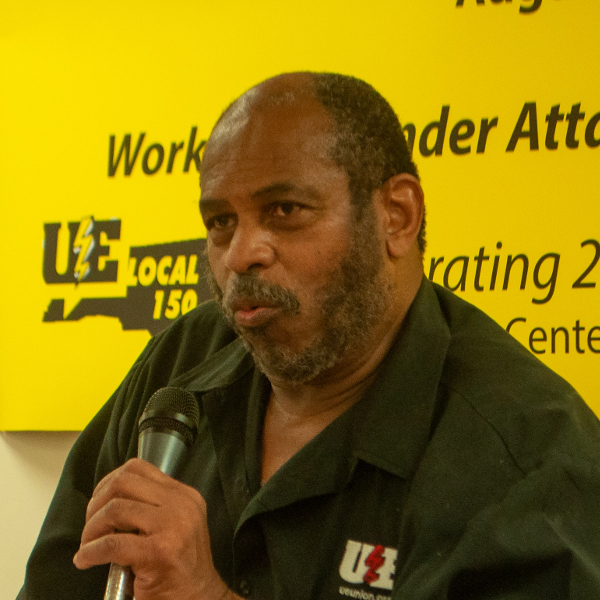
Angaza Laughinghouse
In his review of Local 150 history, Angaza Laughinghouse pointed out that “Workers make history every single day. The workers in this union have made history.” He encouraged delegates both to review the timeline that was in their packet and visit the exhibit of Local 150 history in an adjoining room.
He began a decade and a half before the formal founding of Local 150, reviewing the history of activity by “volunteer worker activists on the front line” that built “the foundation for what kind of union we are today.”
Beginning with the struggle of “K-Mart Workers for Justice” in Rocky Mount in 1982, which led to the formation of Black Workers for Justice, and continuing through the development of the North Carolina Public Service Workers Network, the CDC Workers’ Unity Committee (which affiliated with UE in 1994), and the UNC Housekeepers Association, Laughinghouse described how frontline worker activists built organizations to fight for their rights despite the lack of formal collective bargaining rights. He noted that campaigns for a Dr. King holiday in various workplaces in the 1980s and early 90s were particularly important for developing a network of worker activists throughout the state.
As Laughinghouse said in his introduction, “Folks always ask us, what has this union achieved? There’s no way I can sum up all that in a quick 10-15 minutes.” And indeed, he struggled to get through the timeline of Local 150 activity in his allotted time.
In 1998, Local 150’s UNC Council met with the UNC president in Local 150’s first-ever “meet and confer” meeting, pushing for improvements despite the legal prohibition on collective bargaining. This was followed by a statewide organizing blitz in 1999 which built UE organization among DHHS workers, which has been a pillar of Local 150’s membership ever since.
In the mid-2000s, Local 150 launched the International Worker Justice Campaign, which brought international attention to North Carolina’s denial of the human right of collective bargaining to its public-sector workers.
He also noted that Local 150 was one of the few unions to be actively involved in the Historic Thousands on Jones Street (HKonJ) marches that Bishop Barber organized while he was president of the North Carolina NAACP to promote a working-class agenda for economic and social justice, and of Bishop Barber’s “Moral Mondays” protests at the state legislature opposing anti-worker legislation.
Laughinghouse also touched on the local’s Mental Health Workers Bill of Rights campaign that was launched among DHHS workers in 2008, the Raleigh city sanitation workers’ strike in 2006, the 2012 founding of Southern Workers Assembly, winning a $15 minimum wage for state workers (which was preceded by similar victories for municipal workers in many cities), and the Safe Jobs Save Lives campaign that Local 150 launched during the COVID-19 pandemic.
In concluding his remarks, Laughinghouse emphasized the importance of rank-and-file leaders to the future of the union. “We’ve got to develop more front-line worker activists,” he said. “We’ve got to ask ourselves, are we getting ready for the next 25 years? Are we building new leaders?”
It was a question he had already answered in part in his introduction, when he gestured to the members of the local executive board sitting to his right and declared, “I’m just honored and proud of the new wave of young leaders we have stepping up in our union. … If you think that first wave was something, wait ‘til you get a whiff of this new wave that’s coming, the new wave that has taken us this far, through a pandemic, through a major crisis.
“Through a social, economic and political crisis in this country, our leaders have stood firm, our union has stood firm, and we’re going to make another 25 years of history after this convention.”
Elections, Resolutions, Workshops and Music
President Royall, Vice President Carter and Secretary-Treasurer Harris were all re-elected to two-year terms, and Bonita Johnson was elected as assistant secretary-treasurer. Rakesh Patel, Alex Wall, and Trey Anthony were elected as local trustees.
Delegates also debated and passed resolutions on fighting racism, international solidarity, building the Southern Workers Assembly, M4A and staffing, and defending the rights of women and LGBTQ+ workers. Members had a vigorous debate about what position the local should take on the ongoing crisis and war in Ukraine in the resolution on international solidarity, while all agreeing that the situation “threatens to pull the world into a disastrous nuclear confrontation.”
After one delegate raised a question about whether women’s and LGBTQ+ rights should be dealt with in the same resolution, several other delegates responded that putting those issues into a single resolution emphasizes that “An attack on one of us is an attack on all of us,” and gave full-throated endorsement to everyone’s right to be who they are, regardless of their sexual orientation or gender identity.
Two training sessions included an “Organizing Conversation 101” workshop, an orientation for new members on how chapters function, and workshops on communicating with the media and knowing your rights. The proceedings were also enlivened by musical performances. On Saturday, Local 150 members Nathanette Mayo and Angaza Laughinghouse, of the Fruit of Labor Singing Ensemble, performed “When Justice Speaks,” and Nichel Dunlap-Thompson opened Sunday morning’s session with her original song, “Ain’t Gonna Let This System Turn Me Around,” based on the traditional civil rights movement song “Ain’t Gonna Let Nobody Turn Me ‘Round.”
Videos of President Royall’s State of the Union Address, Brother Laughinghouse’s history presentation, Bishop Barber’s keynote address, and both panels are available on the UE150 YouTube channel.
